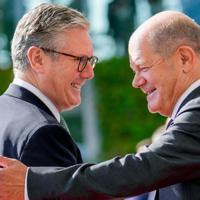BERLIN
U.K. Prime Minister Keir Starmer meets with German Chancellor Olaf Scholz in Berlin on Wednesday to discuss a new partnership between the countries, on his first bilateral trip since taking office last month.
The British leader, who will also travel on to Paris, has pledged to rebuild trust with European allies damaged by Brexit, and is set to hold talks with Scholz about launching a new bilateral accord with Germany.
Labour had said it would seek a security and defense treaty with Germany if it won the July 4 general election, which it did by a landslide—propelling Starmer to the premiership.
The new deal—set to be similar to Britain’s 2010 “Lancaster House” treaty with France—will take several months to negotiate and be finalized early next year, according to Starmer’s Downing Street office.
A “key pillar of the U.K.’s wider reset with Europe,” it will build on a bilateral defense agreement currently being negotiated and expected to be finalized later this year.
It is aimed at boosting business and trade, deepening defense and security cooperation, and increasing “joint action on illegal migration,” Downing Street said.
Starmer’s host Scholz has been under pressure to crack down on illegal migration after a suspected Islamist knife attack in the western city of Solingen on Friday.
The stabbing, which left three people dead and eight injured, was allegedly carried out by a 26-year-old Syrian man who evaded attempts by German authorities to deport him.
Ukraine aid issue
Starmer’s premiership, meanwhile, has faced an early challenge after a deadly knife attack in Southport last month sparked anti-immigration riots, which officials say were stoked by far-right elements and false information.
On his trip to Berlin, Starmer will note that strengthening ties with Germany and France is “crucial” for tackling illegal migration and “boosting economic growth across the continent and crucially in the U.K..”
The talks between Starmer and Scholz will also likely focus on military support for Ukraine, with both countries under pressure over their aid for Kiev to help it fight off Russia’s invasion.
Kiev’s western allies have reacted cautiously to Ukraine’s recent incursion into Kursk, worried that their weapons could be used on Russian soil, possibly sparking a strong reaction from Moscow.
Britain allows Kiev to deploy a squadron of 14 British-made Challenger 2 tanks as it sees fit, but has put limits on the use of its long-range Storm Shadow cruise missiles.
Germany, meanwhile, has repeatedly refused to send Kiev its long-range Taurus missiles over fears of escalating the conflict.
Germany has been the second-largest contributor of aid to Ukraine after the United States, but plans to halve the budget for that aid next year.
Where Germany spent around eight billion euros ($9 billion) on aid for Ukraine in 2024, the latest draft earmarks around four billion euros.
U.K.-Germany security pact
“Clearly, we always encourage allies to continue the crucial support of Ukraine,” a spokesperson for Starmer said ahead of the visit.
At a European Political Community (EPC) summit in England two weeks after his election win, Starmer told European leaders the U.K. would be a “friend and partner” to them.
Starmer has ruled out rejoining the European single market, customs union, or freedom of movement—to avoid reopening what remains a thorny issue among British politicians and the public alike.
But he does want to negotiate a new security pact with the bloc and a veterinary agreement to ease border checks on agricultural foods, as well as an improved trading deal.
Starmer’s visit was a chance to build a “meaningful relationship” with the German leader and support the U.K. premier’s “wider agendas on migration, trade, and defense,” Sophia Gaston, head of foreign policy at the Policy Exchange think tank, told AFP.
The Berlin trip was “the culmination of an early flurry of activity” by Starmer’s new government, said Gaston.
Britain’s Foreign Secretary David Lammy chose Germany for his first trip abroad just two days after Labour’s election victory, calling for a “reset” in relations with European allies.

